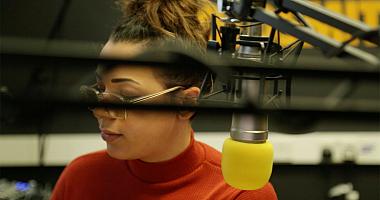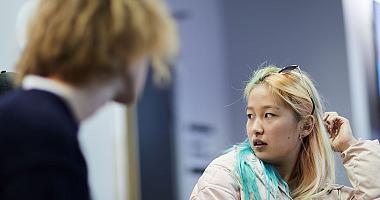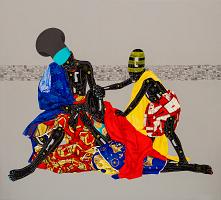MA
Photography Practice
Content navigation menu
Why study MA Photography Practice at Goldsmiths
This Masters is focused on developing your critical and creative photographic practice. It approaches photography as an expanded art form, holding space for its many intersections with other mediums and practices, including but not limited to moving image, CGI, installation, sculpture, performance and technology.
Photography as an art form is undergoing a radical transformation in its contemporary encounter with new technologies such as CGI and Generative AI. This moment also sees a resurgence in artists using traditional analogue technologies and approaches a counterpoint to the increasing quantity and decreasing legibility of the images flooding our everyday lives. With specialist training and facilities in both cutting-edge digital and traditional analogue processes, the MA in Photography Practice encourages you to fully embrace the complexities and opportunities that image-making poses at this exciting point in time.
- The strong synthesis of theory and practice in the programme helps you to develop your own critical perspectives on the meaning, production, and distribution of images in their present and historical contexts.
- You will also advance your knowledge and skills in both digital and analogue technologies, as well as still and durational image-making, installation, and exhibition design.
- You will have the opportunity to take part in a variety of workshops such as:
- Medium/large format film cameras
- Analogue photographic printing in the darkroom
- Portable and studio lighting technologies
- Film technology and alternative darkroom techniques
- Videography and video editing
- Digital imaging
- Digital post-production and editing
- 3D modelling
- Book/zine design and making
- AI image generation
- Throughout your studies, you will have access to analogue and digital cameras, darkrooms, photographic studios, and digital post-production and printing facilities to help you fully realise your work, culminating in an exhibition in the summer.
- The Department of Media, Communications and Cultural Studies has been ranked second in the UK for 'world-leading or internationally excellent' research (Research Excellence Framework, 2021) and 16th in the world (third in the UK) in the 2024 QS World Rankings by Subject.
Contact the department
If you have specific questions about the degree, contact Jacob Love.
Length
1 year full-time
Entry requirements
You should have (or expect to be awarded) an undergraduate degree of at least 2:1 standard in a relevant/related subject. You will also be required to provide a photographic portfolio and a five-minute video or screen recording where you talk about and present your portfolio.
Fees
Home - full-time: £13600
International - full-time: £27200
Department
What you'll study
Compulsory modules
All students take the following modules:
| Module title | Credits |
|---|---|
| Image Construction, Manipulation, and Management | 60 credits |
| The Ascent of the Image | 15 credits |
| Photography and After | 15 credits |
| Portfolio/Project/Viva Voce | 90 credits |
Teaching and learning
This course is interested in the development of the individual voice while situating this development in the context of the wider developments in photography and post-photography, other forms of image-making. To this end, we use a number of teaching formats, such as lectures, seminars, technical sessions, groups crits and individual tutorials.
How you'll be assessed
Original portfolio submission; coursework and essays.
Entry requirements
You should have (or expect to be awarded) an undergraduate degree of at least upper second class standard in a relevant/related subject as well a level of practical experience in a relevant area.
You will also be required to provide a photographic portfolio (10-20 pictures or relevant media) and a five minute video or screen recording where you talk about and present your portfolio.
You might also be considered for the programme if you aren’t a graduate or your degree is in an unrelated field, but you have relevant experience and can show that you have the ability to work at postgraduate level.
International qualifications
We accept a wide range of international qualifications. Find out more about the qualifications we accept from around the world.
If English isn’t your first language, you will need an IELTS score (or equivalent English language qualification) of 7.0 with 7.0 in Speaking and no element lower than 6.5 to study this programme. If you need assistance with your English language, we offer a range of courses that can help prepare you for postgraduate-level study.
How to apply
Apply directly to Goldsmiths using our online application system
You apply directly to Goldsmiths using our online application system.
Before submitting your application you’ll need to have:
- Details of your academic qualifications
- The email address of your referee who we can request a reference from, or alternatively a copy of your academic reference
- Copies of your educational transcripts or certificates
- A personal statement – this can either be uploaded as a Word Document or PDF, or completed online. Please see our guidance on writing a postgraduate statement
- A photographic portfolio (10-20 pictures or relevant media) and a five-minute video or screen recording where you talk about and present your portfolio.
Most decisions will be made on the basis of your application and portfolio but some applicants may be interviewed.
There is no deadline for this programme but we recommend applying early as places are limited.
Find out more about applying.
Fees and funding
Annual tuition fees
These are the PG fees for students starting their programme in the 2025/2026 academic year.
- Home - full-time: £13600
- International - full-time: £27200
If your fees are not listed here, please check our postgraduate fees guidance or contact the Fees Office, who can also advise you about how to pay your fees.
It’s not currently possible for international students to study part-time under a student visa. If you think you might be eligible to study part-time while being on another visa type, please contact our Admissions Team for more information.
If you are looking to pay your fees please see our guide to making a payment.
Funding opportunities
Explore the Goldsmiths scholarships finder to find out what funding you may be eligible for.
Paying your fees
Find out about how to make a payment.
If you are a UK student you may be eligible for a postgraduate loan.
Additional costs
In addition to your tuition fees, you'll be responsible for any additional costs associated with your course, such as buying stationery and paying for photocopying. You can find out more about what you need to budget for on our study costs page.
There may also be specific additional costs associated with your programme. This can include things like paying for field trips or specialist materials for your assignments. Please check the programme specification for more information.
Careers
Where this degree can take you
Graduates from the programme are extremely successful, with finalists working commercially, developing as artists or continuing to enlarge their academic knowledge. During the course, particular attention is given to the development of the individual voice. This, plus students' exposure to a range of technologies, means that our graduates can step into the arena of their choice, or sometimes of their making.
Here are just some examples of the sorts of careers graduates have gone onto:
- Art Director
- Artist
- Animator
- Senior Interactive Designer
- Head of Creative Department
- Head Technical Creative, Experimental Film and Dance
- Commercial Photography (fashion, editorial, photobooks, social, advertising)
- Director (commercial narrative)
- Director Of Photography
- Installation Artist
- Interactive Artist
- Producer
- Curator
Skills you'll gain
You will develop specific practice skills to a high level. You will also develop an advanced understanding of the recent developments in photography and other forms of image-making.
Find out more about employability at Goldsmiths.




.jpg)
